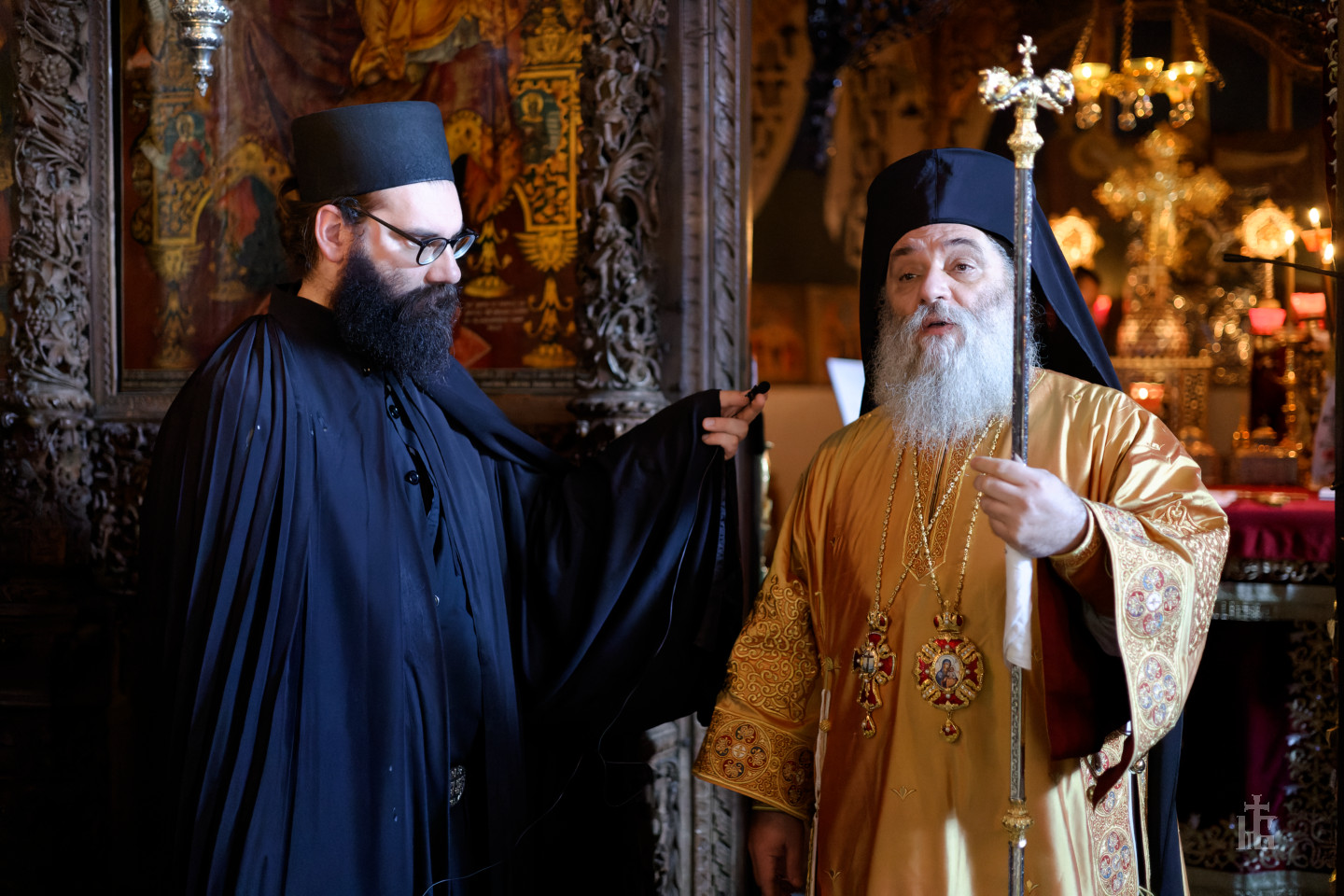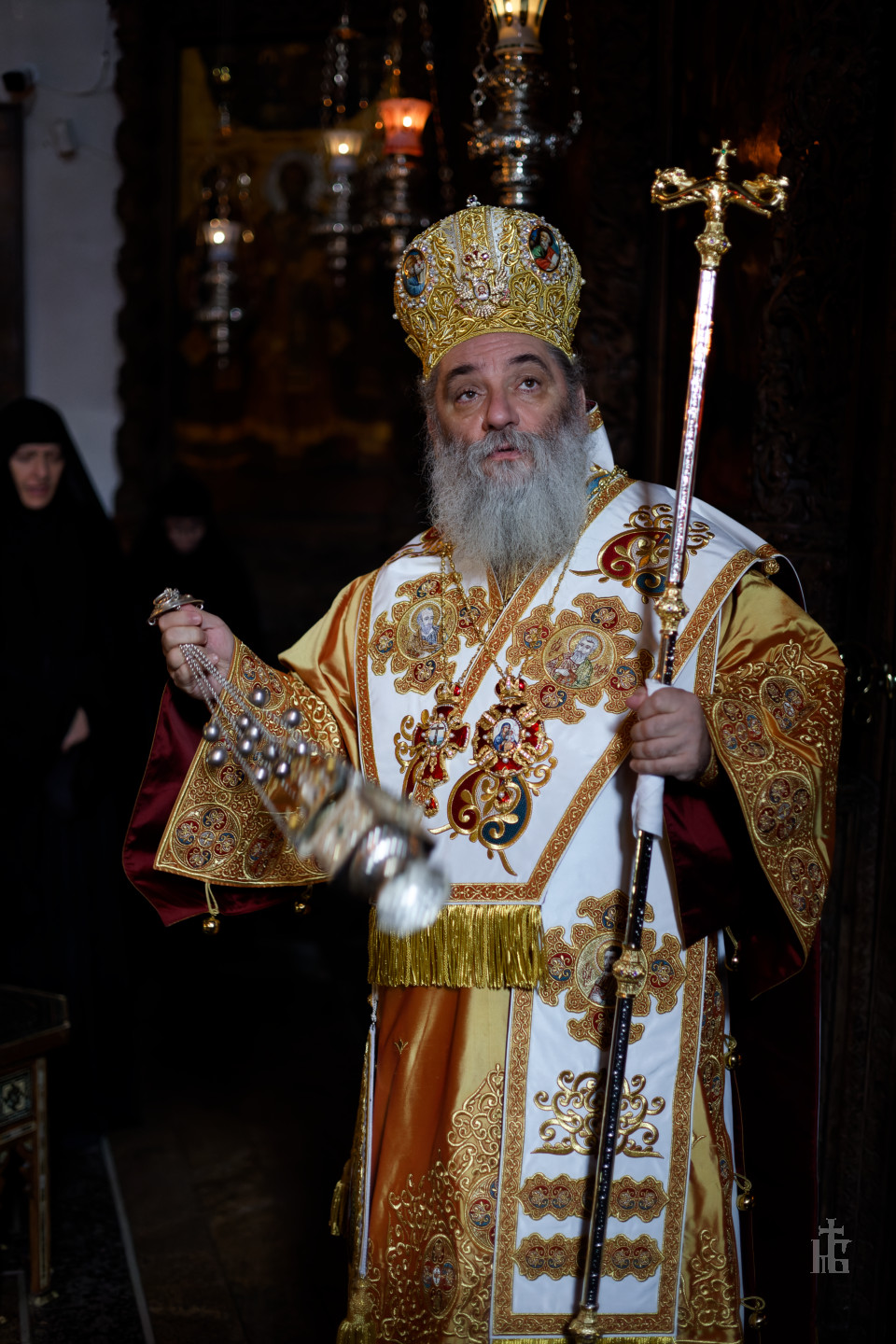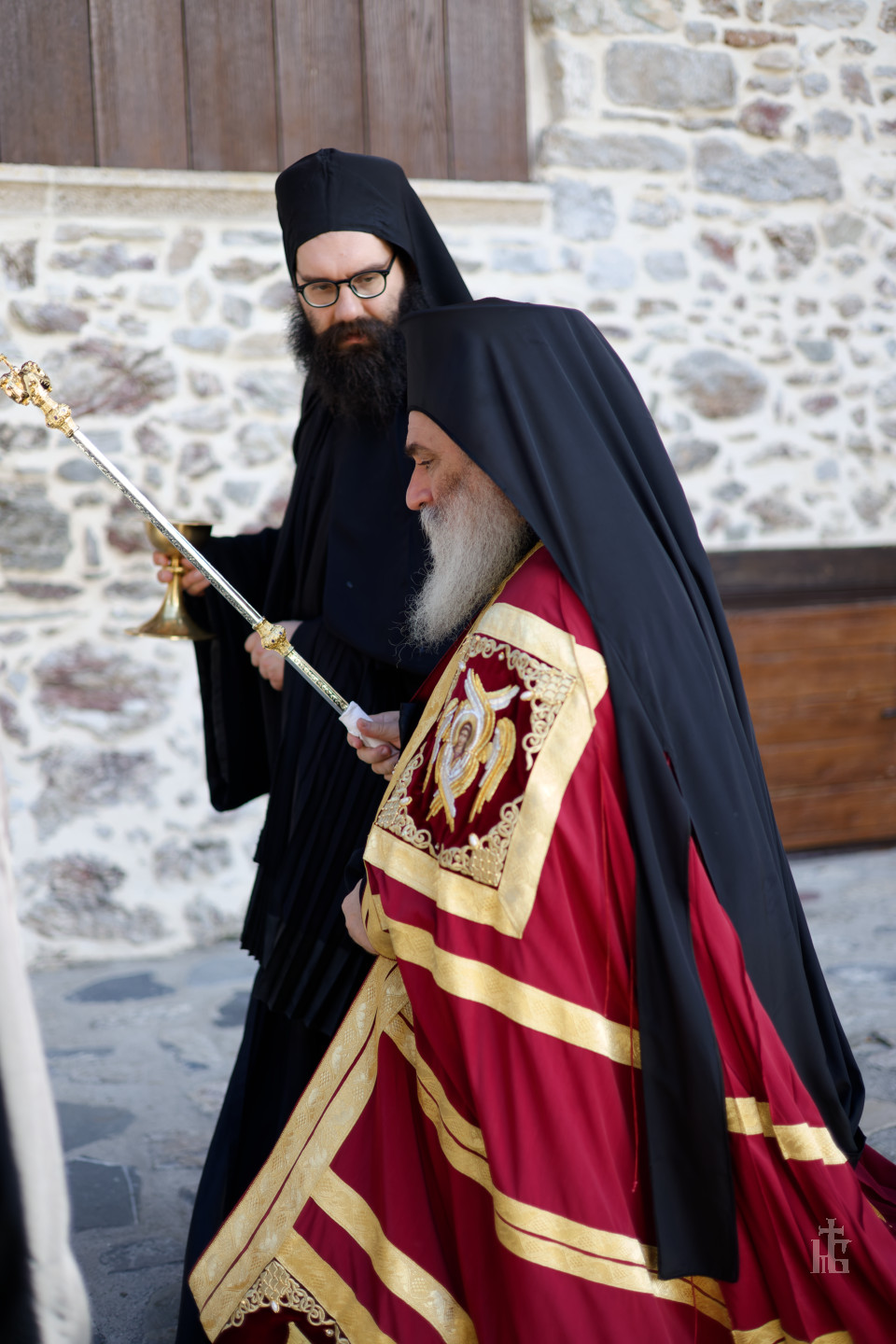Sermon of His Eminence, the Bishop of Antania Mr. Parthenius, Abbot of the Holy Bigorski Monastery, delivered after the Holy Gospel at the Divine Liturgy, on the celebration of Saint Longinus the Centurion, October 16/29, 2023, AD
In the name of the Father and the Son and the Holy Spirit!
Today, my dear ones, we had the opportunity to hear two beautiful gospel readings: one reveals to us the majestic beauty of the parable of the Sower and the seed, the other, however, directs our inner sight towards the drama of the Terrible Golgotha event, accompanied by the confession of the Roman centurion Longinus. He, after seeing everything that happened at the Golgotha on that mournful Good Friday, exclaimed: Truly, this was the Son of God! (Matthew 27:54)
The parable of the Sower and the seed is not just an allegory; it is a reflection of God’s action. Christ begins the parable with quite simple words: A Sower went out to sow his seed (Luke 8:5) Whom do these words refer to? Who is this Sower? It is, in fact, Christ Himself, Who, although equal in honour and glory with God the Father and God the Holy Spirit, came out of the embrace of the Father, came out of the bliss of eternity, but at the same time not leaving it and entered time, came into our history. He came into our world as a Divine Sower, eager to sow His eternal saving doctrine. In addition, He did not come just to preach, but rather to enter into our lives, to act, to sacrifice Himself. He became a Man and not only went through the labours, weaknesses, and limitations of our flesh and nature, but also took upon Himself the painful burdens of sin, all the evil of this world. Therefore, finally, being humbled and crucified on the Cross, He was able to free us from that burden, to resurrect humanity together with Himself and ascend it to Heaven, at the right hand of the Father. Now the path to the Kingdom, to eternal bliss, is open to all of us, because Christ with His body became the first fruit for every human body, so that we all, through the grace of holy baptism, can be saved and deified.

However, in order for the seed of eternity and deification to take root and bear fruit, we need to provide fertile soil. We need to transform our heart into fertile soil, receptive to Christ’s words, to His holy word, that is, to the seed about which He speaks today in the parable. Indeed, we heard about four types of soil, which correspond to four categories of people, depending on how they approach the word of the Lord. For the first cathegory, he says that they are like trampled ground by the road, in which the seed, when it falls on it, has nowhere to take root, and in the end, it is trampled and eaten by the birds. These are the people who listen to the word of God, but are so insensitive and closed for spiritual things, that the devil immediately comes and takes it from their hearts, so that they do not believe and could not be saved. This is the worst category of human hearts and souls. In them, there is simply no slightest possibility for the word to penetrate and take root. They simply do not accept the word of God at all, because they are completely dedicated to this world and are extremely uninterested in anything beautiful and sublime. Their hearts resemble a completely defiled harlot, in which there is not a shred of fear of God and whose conscience is completely burned out, there is not even the slightest thought about any repentance. Unfortunately, in such hearts there can be no room for the redemptive teachings of the Saviour, our Lord Jesus Christ. And it is obvious, the seed of salvation is thrown everywhere, it is intended for all people from the beginning of the world to today. In the Gospel of Christ there is no selectivity and elitism – it is universal for all humankind and everybody is equally invited, so no one will have an excuse before God as to why they did not accept the message of salvation.
The second category of people, the parable continues, are similar to a rocky ground. Although perhaps at the beginning the seed of the word of God will take a little root, that is, it will be accepted with initial joy, however, soon, as soon as temptations come, the root begins to dry up because it does not have enough depth to grow and consequently, there is no fruit. Because, in order for a person to be deified, the word of Christ needs to penetrate not only to the surface of the soul, but to be deeply planted and immersed in its very essence. Christ should not be just a decoration, or a psychological means of escape and overcoming the difficulties in life, but should become our very life. His Divine teaching needs to penetrate deeply into our being, to become its core. Only in this way can we truly be human, godlike, deified personalities.
Yes, it is true that we all have numerous temptations, but that should not scare us. Our life is nothing but a cross. And the cross implies strong temptations, suffering of sufferings, great sacrifice. But, that is why we always have before us the first and greatest Cross-bearer, our dear Savior, Who became an example for all of us as to how to carry the cross of life. He at the Terrible Golgotha spread His arms and embraced the whole world, sending from there His strongest sermon and message, the one about sacrificial and perfect effective love. Having His greatest and life-giving Cross and the victory won on it before our eyes, what should we, who carry incomparably smaller life crosses, be afraid of? Even if now of trials they seem too heavy to us, they, however, are actually much lighter, compared to His. The Golgotha Cross-bearer voluntarily climbed on His huge and heavy Cross, to help all of us to more easily bear our personal crosses.
The third category of people described in Christ’s parable are those whose heart and mind fall on thorny soil. They too listen to the word of God, but as soon as they leave, the seed in them immediately begins to be choked by the thorns of earthly cares, riches, and pleasures of this life and does not bear fruit. These people wholeheartedly devote themselves only to passions, care only for the material, the luxury and hedonism. Spiritual life, on the other hand, is completely opposite to all this. The meaning of Christ’s Cross is that through it all of us are to be raised into the spiritual world, into the joy of eternal existence. “For, behold, through the Cross came joy to the whole world.” Through the Cross came the Resurrection and through the cross all the mysteries of Heaven are revealed to us. Embracing our cross with the deepest humility and heartfelt love, we will become like the fourth category of people in the parable, represented by fertile soil that gives a hundredfold fruit. And that which fell on the good ground are those with an honest and good heart, who having heard the word, kept it, and brought forth fruit with patience (Luke 8:15).

This Sunday, in the shadow of the Golgotha events, we remember and celebrate the memory of Saint Longinus, the Roman centurion who was a witness to the terrible and majestic moments of Christ’s death and Resurrection. As a Roman soldier, Longinus was placed on guard at the Cross of Golgotha, and then later at the Holy Sepulchre of the Lord. Thus, he unintentionally became a witness to the great mysteries of our salvation. And not just a witness, but truly turned out to be a fertile soil, receptive to God’s love and mercy. Indeed, when Longinus saw all those terrible deeds, the crucifixion and suffering of the Innocent, when he felt the earthquake and saw the darkening of the Sun; when he realized that He who they had crucified was so good and meek, that even to His crucifiers He looked with love and pity and prayed for them to God the Father, saying: Father, forgive them; for they know not what they do! (Luke 23:34). When he heard the unusual words that It is finished (John 19:30), meaning that the Son of God, the Savior of the world, had done everything necessary for the human salvation, he was moved to the deepest end of his being. The transformed Roman soldier exclaimed loudly before his fellow soldiers and before the other present witnesses of that unbearable sight: Truly, this was the Son of God! (Matthew 27:54)
Saint Longinus, therefore, was not just a passive witness to this unique event in the history of mankind. He was deeply moved and transformed by Christ’s immeasurable love and mercy. Therefore, his historical exclamation uttered under the agony of the Cross, revealed the true face of Christ and the transformed heart of a man who came to believe. Although in the end, he was ordered to pierce Christ’s body with a spear, so that the Jews and all present could be assured that the Crucified was indeed dead, he remains to this day a living example of the transformation that can occur in a person’s heart in the presence of God. He uttered his words of testimony on behalf of all who will believe that Jesus Christ is the crucified Son of God, but even more – he uttered them to confirm before all those who will doubt, as an indisputable statement from a hitherto pagan who had seen and known the true God. His faith was finally confirmed at the moment when, being on guard at the Holy Sepulchre, where Jesus’ body had been laid, he saw the glow of the unearthly light, and then the stone rolled away from the Tomb, which remained empty. Thus, Saint Longinus was counted among the first eyewitnesses of Christ’s Resurrection. Since then, he had greatly loved his life’s cross, having realised that in the end, if the cross is carried with faith, love, and patience, it leads to salvation and resurrection. He accepted the first Cross-bearer as a model for his life and accepted His words of resurrection. Although in the continuation Saint Longinus was under pressure from the Jews to renounce what he had seen and to change his testimony, he preferred to remain faithful to the truth and to his newly discovered Lord, even at the cost of his life. His sacrifice is a symbol of the faithfulness and devotion that every believer should have towards Christ. From his life, we know that because of his faith and constant pressures he gave up military service, was expelled and, together with two soldiers from his squad, who had also seen the terrible events, lived for some time far from the eyes of the Jewish and Roman authorities, fully dedicating himself to God. But because the Roman administration condemned him to death for treason, a group was sent after him. He gently awaited the soldiers, received them in his home and entertained them, and the next morning he introduced himself and voluntarily surrendered to them, asking them to carry out the duty for which they were sent. Because he was a Roman citizen, Saint Longinus was beheaded for his faith in our Savior, a faith that he sealed with his martyr’s blood and thus once again confirmed the truth that he had seen with his own eyes. Therefore, today we celebrate him as not only a martyr and saint of God, but also as an icon of transformation, as an example for us, Christians, that we should all accept in our hearts Christ’s salvific message and live in accordance with it.
Therefore, my dear ones, let us too accept and get to love the salvific teachings of our beloved Christ, for it is the only one that brings joy and revives. We are very privileged to be baptized in the name of Christ and to be clothed in Him, to listen to His word, to read His Holy Gospel. For, through the pages of that salvific Book, we enter the only truth of the Universe. And, as time goes on in history, we see and are more and more convinced that apart from Christ there is no other answer in this world. We live in a very troubled world and can see that contemporary man is becoming more and more dehumanized, losing even the basic human characteristic, not to mention his spirituality and degree of deification. We can no longer talk about a godlike man, because unfortunately, people are beginning to resemble humanoid animals. We constantly hear about ugly things, everywhere proclamation of wars, as we have been foretold in the Gospel. Actually, the opponents of Christ, the antichrists, have been active since the time of Christ and the Apostles. Saint John the Theologian writes: This is the spirit of antichrist, whereof ye have heard that it cometh; and even now already is it in the world (1 John 4:3). These are, in fact, all those who over the past two thousand years did not believe that Jesus Christ, the Son of God, came in the flesh to Earth, that He rose from His Tomb and that He is the Savior of the world.
Therefore, my dear ones, let us adopt the lesson from today’s two beautiful gospel readings, about the Sower and the seed and about the Golgotha events and the transformation of Saint Longinus, whose heart proved to be fertile soil for the word of Christ. Let us accept the cross as our life path, for it is our resurrection and our ascension. Let us become fertile soil for the Divine Sower, first of all we who call ourselves churched faithful, for we are those who go to the temples for worship and unite with Christ’s body and blood, becoming consubstantial with Him, brothers and sisters of His. Therefore, let us first start bearing fruits of kindness, forgiveness, love, generosity, breadth, joy, so that we can become an example and magnet for others, and they could also follow Christ. It is beautiful and a great blessing when you are a light to others. For, the light of Christ is needed always and by everyone, especially in these troubled times, in which we constantly hear about wars and hostilities among nations. Let us pray to our Savior, the heavenly Sower, the Crucified on Golgotha and the Resurrected One, to cultivate our hearts and turn them into fertile soil for His word. Amen!














